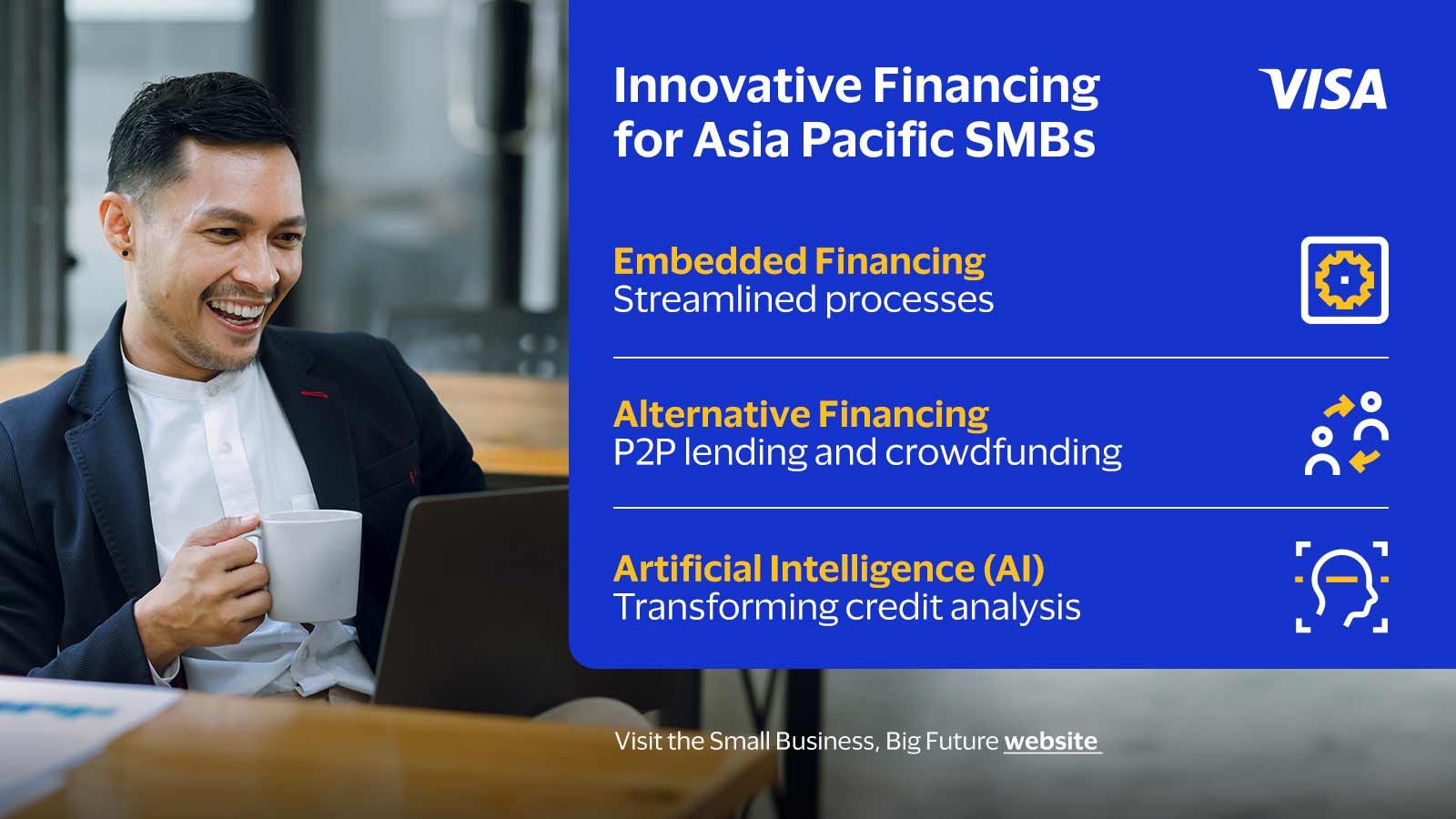Innovative financing solutions making a difference for Asia Pacific SMBs
Small and medium-sized businesses (SMBs) are vital to Asia Pacific’s economic landscape, comprising 98 per cent of all businesses.¹ However, they face a USD2.4 trillion funding gap, highlighting a significant disparity that underscores the urgent need for improved access to financing.² This gap reveals that SMBs require enhanced financial support to unlock their full potential and drive greater economic impact.
Despite their importance, SMBs face substantial challenges in accessing working capital compared to larger enterprises. Traditional lending frameworks often favour bigger firms, leading to higher collateral requirements and interest rates for SMBs – if they can secure financing at all. Without an established credit history, many financial institutions are unwilling to lend to them altogether. Furthermore, loan application and approval processes can take up to weeks and months, due to the need for thorough documentation and risk assessment. Consequently, many SMBs struggle to secure the necessary financing for growth and expansion. Addressing these financial hurdles is crucial; increased access to capital would enable SMBs to invest in their operations, innovate, and expand their market reach.
Fortunately, fintech solutions are transforming the landscape of SMB financing by offering more accessible and flexible options. Technologies, particularly embedded financing, alternative lending platforms, and artificial intelligence (AI), will expand financial inclusion. These innovations are designed to bridge the financing gap that has long hindered SMB growth.

Embedded financing: Simplifying financial processes
Embedded financing represents a significant shift in how SMBs gain access to capital. By integrating financial services, such as financing and lending, directly into non-financial platforms and applications, businesses can streamline their financial processes. This integration allows SMBs to access funds seamlessly within existing business tools, reducing the barriers traditionally associated with obtaining financing.
A prime example of embedded financing is Doxa Connex, a procurement-to-payment platform specifically designed for the construction and real estate industries. In partnership with Visa, Doxa has enhanced its platform to provide embedded financing capabilities. This collaboration aims to address the challenges of extended payment cycles and complex claims submissions that often plague the construction sector.
Once developers or main contractors certify work claims, subcontractors using Doxa Connex can opt to receive payments through virtual cards before the invoice due date. This feature significantly improves cash flow for subcontractors, allowing them to manage their operations more effectively without waiting for traditional payment cycles that can extend from 35 to 100 days.³ By streamlining the procure-to-pay process, Doxa Connex not only enhances operational efficiency but also fosters better relationships among contractors, subcontractors, and financiers.
Alternative financing: Tapping on peer-to-peer lending and crowdfunding
Other transformative innovations in SMB financing are peer-to-peer (P2P) lending and crowdfunding. These models connect SMBs directly with individual and institutional investors at scale, offering competitive rates that often surpass those available through traditional banks.
Funding Societies, for example, is one of Southeast Asia's leading P2P lending platforms. Launched in 2015, the Singapore-based fintech specialises in short-term financing for SMBs funded by a network of individual and institutional investors. The platform facilitates quick loan approvals—often within 24 hours—allowing businesses to access funds when they need them most.⁴
Crowdfunding also plays a pivotal role in expanding financial access for SMBs. These platforms allow businesses to present their projects or ideas to a broad audience of potential investors. By leveraging social networks and community support, SMBs can raise funds without relying solely on traditional financial institutions. Crowdfunding provides funding opportunities at scale, enabling startups and established businesses alike to secure capital while building a community of supporters who are invested in their success.
AI: Transforming credit analysis and access
AI is transforming credit assessment by accelerating the utilisation of non-traditional data sources to evaluate creditworthiness. AI-powered algorithms analyse various data points—such as digital transaction data, supply chain information, and point-of-sale data—to provide a more comprehensive view of a business's financial health.
In Hong Kong, fintech startup InRiskable has created an AI solution that employs advanced AI algorithms to analyse a wide range of data points, allowing banks to assess SMB credit risks with better efficiency.⁵ Apart from speeding up credit assessments, the solution gathers data from various online sources, including digital news platforms and public records, to uncover "invisible risks" that traditional methods might overlook. This capability is crucial for assessing SMBs that may not have extensive financial histories or established banking relationships.
Startups like InRiskable exemplify how AI innovation can address longstanding challenges in the assessment of SMB credit risk. By leveraging AI technology to streamline processes and enhance accuracy, the platform not only benefits financial institutions but also supports the growth of SMBs by facilitating access to necessary funding.
The fintech innovations transforming SMB financing—embedded services, alternative lending platforms, and AI-driven credit assessments—are crucial in addressing the financial challenges faced by small businesses. By simplifying access to capital and leveraging technology, these solutions empower SMBs to optimise their operations and drive growth. As these trends continue to evolve, it is essential for SMBs to stay informed about available financing options and consider integrating these innovative solutions into their business strategies. By doing so, they can enhance their financial resilience and contribute more significantly to economic development in the region.
¹ Visa, Enabling Small and Medium-Sized Businesses (SMBs) with Access to Funding and Financial Education, 2024.
² Visa, Enabling Small and Medium-Sized Businesses (SMBs) with Access to Funding and Financial Education, 2024.
³ Visa, Visa, UOB and Doxa transform payment processes for the construction industry, 2023.
⁴ Funding Societies, accessed September 2024.
⁵ Asian Business Review, Fintech startup streamlines SME credit assessment for banks through AI, 2024.